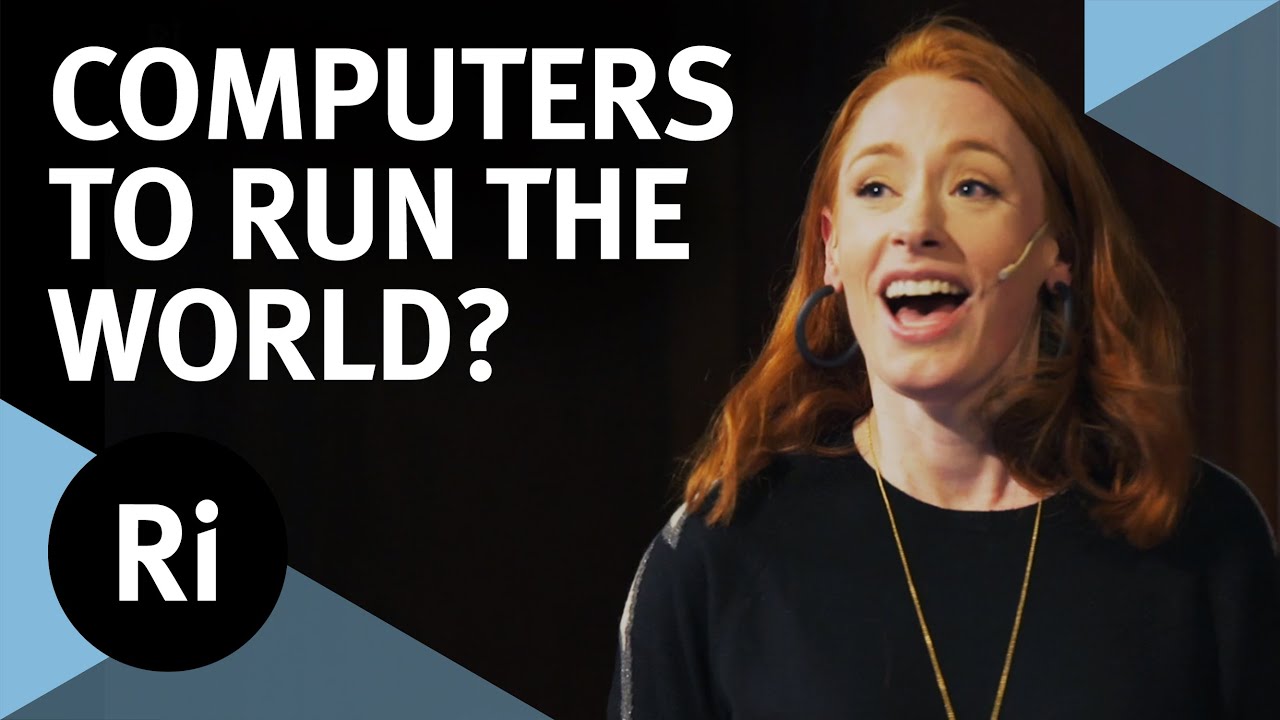The Royal Institution
Algorithms are increasingly used to make decisions in healthcare, transport, finance and security. How can they best be used and what happens when things go wrong?
Subscribe for regular science videos: http://bit.ly/RiSubscRibe
Buy Hannah’s book “Hello World”: https://geni.us/Has6
Hannah Fry takes us on a tour of the good, the bad and the downright ugly of the algorithms that surround us. She lifts the lid on their inner workings, to demonstrate their power, expose their limitations, and examine whether they really are an improvement on the humans they are replacing.
Watch the Q&A: https://youtu.be/6oWliz-bNvQ
Hannah Fry is an Associate Professor in the mathematics of cities from University College London. In her day job she uses mathematical models to study patterns in human behaviour, and has worked with governments, police forces, health analysts and supermarkets. Her TED talks have amassed millions of views and she has fronted television documentaries for the BBC and PBS; she also hosts the long-running science podcast, ‘The Curious Cases of Rutherford & Fry’ with the BBC.
This talk and Q&A were filed at the Ri on 30 November 2018.
—
A very special thank you to our Patreon supporters who help make these videos happen, especially:
Dave Ostler, David Lindo, Elizabeth Greasley, Greg Nagel, Ivan Korolev, Lester Su, Osian Gwyn Williams, Radu Tizu, Rebecca Pan, Robert Hillier, Roger Baker, Sergei Solovev and Will Knott.
—
The Ri is on Patreon: https://www.patreon.com/TheRoyalInstitution
and Twitter: http://twitter.com/ri_science
and Facebook: http://www.facebook.com/royalinstitution
and Tumblr: http://ri-science.tumblr.com/
Our editorial policy: http://www.rigb.org/home/editorial-policy
Subscribe for the latest science videos: http://bit.ly/RiNewsletter
Product links on this page may be affiliate links which means it won’t cost you any extra but we may earn a small commission if you decide to purchase through the link.
Source




Did the disability people get to keep the raises?
exactly what I tought, that the first piece lacked a lot of musicality while the second had an impressive ammount of instrumentation. I even thought that a dry piece of Bach was chosed on purpose to throw people off xD
This is why Bird Law is so important these days. Bird Lawyers like Charlie Kelly could act as watchdogs for malpractice when birds start to take jobs in medicine.
Brilliant, interesting and beautiful
I love her voice, and her book about Santa Claus was a wonderful read. Excellent speaker.
Sounds like Assimov's psycohistory from the Foundation series. An algorithm can develop the future if the math is good enough.
I could listen to Dr. Fry all. Day. Long.
Loved this talk. Some great science communication.
The early internet was comprised of people doing the searching (and thinking) themselves. My google results were the same as yours, and Google knew and even SAID that was important. The day that changed, and predictive engines grew to become mainstream, things turned for the worse. These algorithms must be extinguished. And sadly they won't, as they exist to serve corporations, not people.
The bigger question here is, do you want humans to be replaced by silicon-based entities? All of these errors and quirks will be corrected as silicon improves, and new developments continue to be made. And eventually they will replace you, in every way. Ask yourself, do you want that. That is the question that faces us, though few people are realizing or discussing it.
The problem I see with the use of that technology is that if it falls in the wrong hands you may have a bad professional that looks good because of the technologies assistance and hard to be spotted until is too late…
Some algorithms I see are so damn scary. Like one that screens videos with applicants for jobs for body language and determines whether they'd be a good fit for the job or not. Except. I am disabled in such a way that my body language deviates strongly from normal. These algorithms are wired against me and people like me. The scariest thing is that for self-learning algorithms, we often don't know what's under the hood. These things are spreadsheets upon spreadsheets, building correleations on top of correlations on top of correlations but and we have no clue what they're basing these correlations on. I want technology like this to be used for good, like the cancer research mentioned in the talk, but they have to be used with extreme caution.
Computer music? Its Bach is worse than its kilobyte.
save ]29:00+090s[ data for good: the nun cognitive dataset
save ]34:30+034s[ human/machine partnership to balance the sensitive and specific biases
6:44 unexpected but surprisingly accurate lol
Just loooooooooooooove Hannah Fry! 👍🤓❤️
Doctors that get paid millions a year to read slides? that job is going away REAL QUICK.
music in this case is replicating from something already existing not composing…whats about Jamming? Could we imagine Hendrix could have been a machine, maybe Hendrix as seed then u could create " Hendrix series"? ( Algo speaking )… Music should be an anchor to remember us that differences enrich us as species ( machine animals humans). Sorry fro my english…no native. Earth made and born.
For music the difference is that AI tunes lack intentionality and cannot result from the creative outpouring of a sensitive soul. There is no comparison and it could never do what living music does outside of true artificial life, which would require a very different logic of relation than the ones computers are capable of processing. however it could replace music as a commodity in our daily lives, as feeling is increasingly oppressed by the cold intentionality of technology and living relationships disintegrate into a bleak merely informational world where gamified meaning-making is carried out at the mercy of cybernetic controls.
yeah, I love her, he he
I'd like to know if the performers who played/sang the 2 "Bach styled" pieces knew which was which? While I'm no great fan of Bach (I find his work a bit too stiff for my tastes), the second piece had something in it that made you want to hear the rest while the first piece felt more like a TV commercial…….it was beautiful, but I couldn't have cared less if it continued. My question is, would that have been due to the actual piece or the performance?
Beyond that, this was an incredibly interesting lecture by an intelligent and beautiful woman. I found this fascinating.
She's delightful.
Red heads make me mildly a…
The cow isbehind the trees
Computers WILL run the world, regardless what you think.
I don't find the data from the experiment on the radiologists to be fair. They may have "looked" at the gorilla but didn't see it as they're not scanning for gorillas, they're looking for recognizable structures which might indicate an abnormality, tumor etc. And the gorilla may have not stood out from the background as irregular(color, shape). Kind of like when you lose something, it's in your line of sight, yet you still can't find it because you don't expect it to be where it is (gorilla in a lung scan). But with the gorilla you don't even know what to look for to begin with.🤷♂️